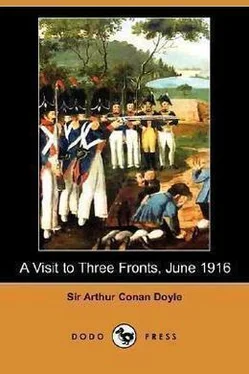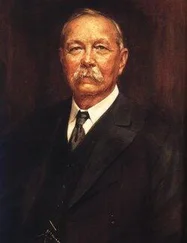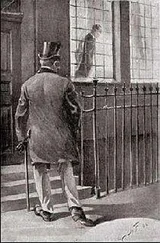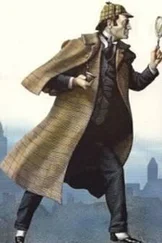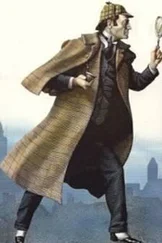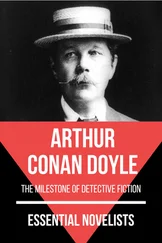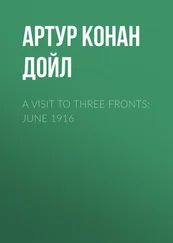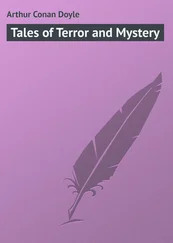Arthur Doyle - A Visit to Three Fronts
Здесь есть возможность читать онлайн «Arthur Doyle - A Visit to Three Fronts» весь текст электронной книги совершенно бесплатно (целиком полную версию без сокращений). В некоторых случаях можно слушать аудио, скачать через торрент в формате fb2 и присутствует краткое содержание. Год выпуска: 2014, Издательство: epubBooks Classics, Жанр: Биографии и Мемуары, Публицистика, prose_military, на английском языке. Описание произведения, (предисловие) а так же отзывы посетителей доступны на портале библиотеки ЛибКат.
- Название:A Visit to Three Fronts
- Автор:
- Издательство:epubBooks Classics
- Жанр:
- Год:2014
- ISBN:нет данных
- Рейтинг книги:3 / 5. Голосов: 1
-
Избранное:Добавить в избранное
- Отзывы:
-
Ваша оценка:
- 60
- 1
- 2
- 3
- 4
- 5
A Visit to Three Fronts: краткое содержание, описание и аннотация
Предлагаем к чтению аннотацию, описание, краткое содержание или предисловие (зависит от того, что написал сам автор книги «A Visit to Three Fronts»). Если вы не нашли необходимую информацию о книге — напишите в комментариях, мы постараемся отыскать её.
A Visit to Three Fronts — читать онлайн бесплатно полную книгу (весь текст) целиком
Ниже представлен текст книги, разбитый по страницам. Система сохранения места последней прочитанной страницы, позволяет с удобством читать онлайн бесплатно книгу «A Visit to Three Fronts», без необходимости каждый раз заново искать на чём Вы остановились. Поставьте закладку, и сможете в любой момент перейти на страницу, на которой закончили чтение.
Интервал:
Закладка:
But I have wandered far from the trenches of Soissons. It had come on to rain heavily, and we were forced to take refuge in the dugout of the sniper. Eight of us sat in the deep gloom huddled closely together. The Commandant was still harping upon that ill–placed machine gun. He could not get over it. My imperfect ear for French could not follow all his complaints, but some defence of the offender brought forth a 'Jamais! Jamais! Jamais!' which was rapped out as if it came from the gun itself. There were eight of us in an underground burrow, and some were smoking. Better a deluge than such an atmosphere as that. But if there is a thing upon earth which the French officer shies at it is rain and mud. The reason is that he is extraordinarily natty in his person. His charming blue uniform, his facings, his brown gaiters, boots and belts are always just as smart as paint. He is the Dandy of the European war. I noticed officers in the trenches with their trousers carefully pressed. It is all to the good, I think. Wellington said that the dandies made his best officers. It is difficult for the men to get rattled or despondent when they see the debonair appearance of their leaders.
Among the many neat little marks upon the French uniforms which indicate with precision but without obtrusion the rank and arm of the wearer, there was one which puzzled me. It was to be found on the left sleeve of men of all ranks, from generals to privates, and it consisted of small gold chevrons, one, two, or more. No rule seemed to regulate them, for the general might have none, and I have heard of the private who wore ten. Then I solved the mystery. They are the record of wounds received. What an admirable idea! Surely we should hasten to introduce it among our own soldiers. It costs little and it means much. If you can allay the smart of a wound by the knowledge that it brings lasting honour to the man among his fellows, then surely it should be done. Medals, too, are more freely distributed and with more public parade than in our service. I am convinced that the effect is good.
The rain has now stopped, and we climb from our burrow. Again we are led down that endless line of communication trench, again we stumble through the ruins, again we emerge into the street where our cars are awaiting us. Above our heads the sharp artillery duel is going merrily forward. The French are firing three or four to one, which has been my experience at every point I have touched upon the Allied front. Thanks to the extraordinary zeal of the French workers, especially of the French women, and to the clever adaptation of machinery by their engineers, their supplies are abundant. Even now they turn out more shells a day than we do. That, however, excludes our supply for the Fleet. But it is one of the miracles of the war that the French, with their coal and iron in the hands of the enemy, have been able to equal the production of our great industrial centres. The steel, of course, is supplied by us. To that extent we can claim credit for the result.
And so, after the ceremony of the walking–sticks, we bid adieu to the lines of Soissons. To–morrow we start for a longer tour to the more formidable district of the Argonne, the neighbour of Verdun, and itself the scene of so much that is glorious and tragic.
II
There is a couplet of Stevenson's which haunts me, 'There fell a war in a woody place—in a land beyond the sea.' I have just come back from spending three wonderful dream days in that woody place. It lies with the open, bosky country of Verdun on its immediate right, and the chalk downs of Champagne upon its left. If one could imagine the lines being taken right through our New Forest or the American Adirondacks it would give some idea of the terrain, save that it is a very undulating country of abrupt hills and dales. It is this peculiarity which has made the war on this front different to any other, more picturesque and more secret. In front the fighting lines are half in the clay soil, half behind the shelter of fallen trunks. Between the two the main bulk of the soldiers live like animals of the woodlands, burrowing on the hillsides and among the roots of the trees. It is a war by itself, and a very wonderful one to see. At three different points I have visited the front in this broad region, wandering from the lines of one army corps to that of another. In all three I found the same conditions, and in all three I found also the same pleasing fact which I had discovered at Soissons, that the fire of the French was at least five, and very often ten shots to one of the Boche. It used not to be so. The Germans used to scrupulously return shot for shot. But whether they have moved their guns to the neighbouring Verdun, or whether, as is more likely, all the munitions are going there, it is certain that they were very outclassed upon the three days (June 10, 11, 12) which I allude to. There were signs that for some reason their spirits were at a low ebb. On the evening before our arrival the French had massed all their bands at the front, and, in honour of the Russian victory, had played the Marseillaise and the Russian National hymn, winding up with general shoutings and objurgations calculated to annoy. Failing to stir up the Boche, they had ended by a salute from a hundred shotted guns. After trailing their coats up and down the line they had finally to give up the attempt to draw the enemy. Want of food may possibly have caused a decline in the German spirit. There is some reason to believe that they feed up their fighting men at the places like Verdun or Hooge, where they need all their energy, at the expense of the men who are on the defensive. If so, we may find it out when we attack. The French officers assured me that the prisoners and deserters made bitter complaints of their scale of rations. And yet it is hard to believe that the fine efforts of our enemy at Verdun are the work of half–starved men.
To return to my personal impressions, it was at Chalons that we left the Paris train—a town which was just touched by the most forward ripple of the first great German floodtide. A drive of some twenty miles took us to St. Menehould, and another ten brought us to the front in the sector of Divisional–General H. A fine soldier this, and heaven help Germany if he and his division get within its borders, for he is, as one can see at a glance, a man of iron who has been goaded to fierceness by all that his beloved country has endured. He is a man of middle size, swarthy, hawk–like, very abrupt in his movements, with two steel grey eyes, which are the most searching that mine have ever met. His hospitality and courtesy to us were beyond all bounds, but there is another side to him, and it is one which it is wiser not to provoke. In person he took us to his lines, passing through the usual shot–torn villages behind them. Where the road dips down into the great forest there is one particular spot which is visible to the German artillery observers. The General mentioned it at the time, but his remark seemed to have no personal interest. We understood it better on our return in the evening.
Now we found ourselves in the depths of the woods, primeval woods of oak and beech in the deep clay soil that the great oak loves. There had been rain and the forest paths were ankle deep in mire. Everywhere, to right and left, soldiers' faces, hard and rough from a year of open air, gazed up at us from their burrows in the ground. Presently an alert, blue–clad figure stood in the path to greet us. It was the Colonel of the sector. He was ridiculously like Cyrano de Bergerac as depicted by the late M. Coquelin, save that his nose was of more moderate proportion. The ruddy colouring, the bristling feline full–ended moustache, the solidity of pose, the backward tilt of the head, the general suggestion of the bantam cock, were all there facing us as he stood amid the leaves in the sunlight. Gauntlets and a long rapier—nothing else was wanting. Something had amused Cyrano. His moustache quivered with suppressed mirth, and his blue eyes were demurely gleaming. Then the joke came out. He had spotted a German working party, his guns had concentrated on it, and afterwards he had seen the stretchers go forward. A grim joke, it may seem. But the French see this war from a different angle to us. If we had the Boche sitting on our heads for two years, and were not yet quite sure whether we could ever get him off again, we should get Cyrano's point of view. Those of us who have had our folk murdered by Zeppelins or tortured in German prisons have probably got it already.
Читать дальшеИнтервал:
Закладка:
Похожие книги на «A Visit to Three Fronts»
Представляем Вашему вниманию похожие книги на «A Visit to Three Fronts» списком для выбора. Мы отобрали схожую по названию и смыслу литературу в надежде предоставить читателям больше вариантов отыскать новые, интересные, ещё непрочитанные произведения.
Обсуждение, отзывы о книге «A Visit to Three Fronts» и просто собственные мнения читателей. Оставьте ваши комментарии, напишите, что Вы думаете о произведении, его смысле или главных героях. Укажите что конкретно понравилось, а что нет, и почему Вы так считаете.
